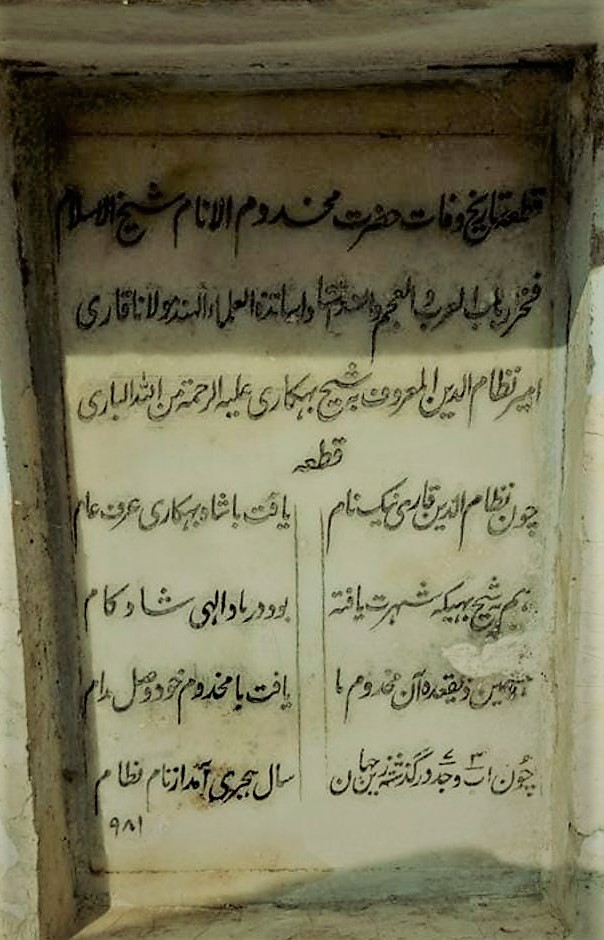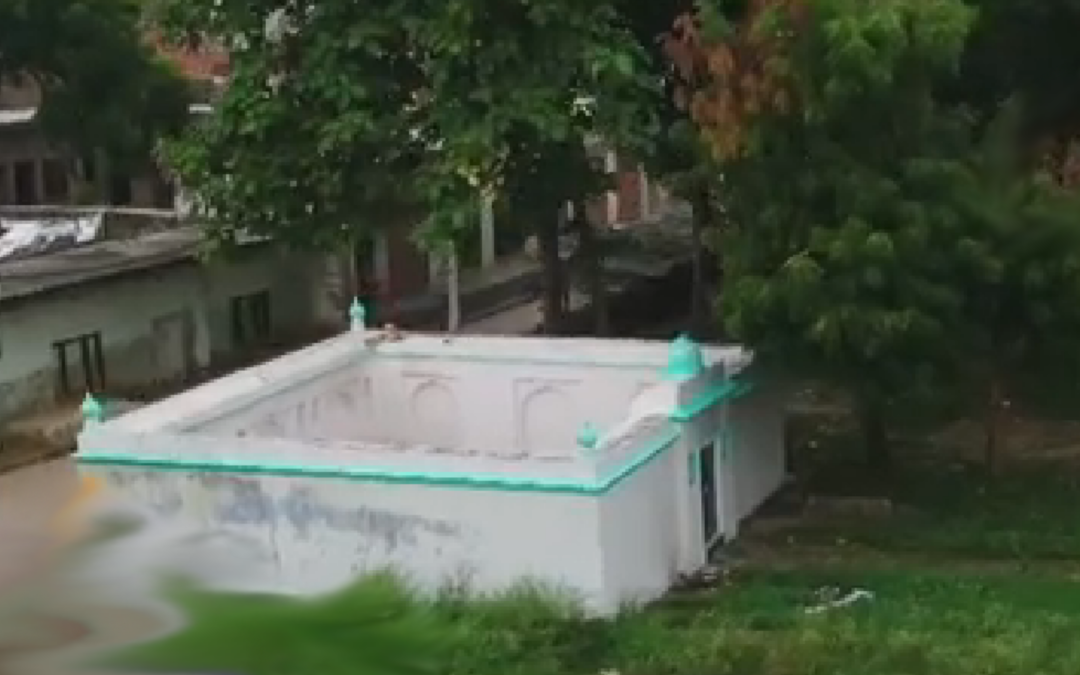Shah Bheeka/Bhikhari of Kakori (1485-1574 )
India is regarded as the Land of Saints. They all had a beautiful common message i.e. righteousness and universal brotherhood. The most productive period in the history was probably the medieval period when there was no city or a place of note where a saint or a number of saints were not present. Oudh or Awadh being one of the prominent centers of Sufism, it has a long list of mystic scholars and saints all over the state yet many Sufi figures have been forgotten or are unknown to the present generation.
We shall read here about one of the lesser known saints of North India who was a renowned figure in his lifetime and his couplets are reportedly included in the Adi Granth of Sikh faith.
In the old chronicles he is mentioned variably as Shaikh Bhikan , Shaikh Bheek or Shaikh Bhikari of Kakori.
Kakori , the reputed town is located some 8 miles away from the city centre Lucknow , one of the most celebrated and literate towns of Awadh , Kakori boasts of everything that epitomizes culture and civility, an epicenter of Language, literature, Kabab and Mangoes . Kakori has it all for you. With hundreds of nobles and civil servants in Nawabi and colonial era , it was a seat of Urdu Language & literature. The tradition of Tasawwuf and Adab runs deep in the town , it is famous today for being a seat of the Qadiria Qalandaria Sufi order founded by Shah Kazim Qalandar (d.1806 AD) , a tradition that is followed and extended by his descendants to this day. 
During the reign of Saleem Shah Sur , a scholar Qari Ameer Saifuddin Alavi came with his family and settled in Kakori. His descendents are today known as Makhdoom Zadgan . It requires amount of an encyclopedic work to account the men produced by this branch of Alavis.
Qari Shaikh Nizamuddin Alavi Alias Shaikh Bheeka or Bhikari was born in Kakori in 890 Hijri. He was one of the most learned scholars of Akbar’s time who ws held in high repute for his piety , learning and wisdom.
He was initially taught by his father Qari Saifuddin, a scholar in his own right, later tutored by several other masters like Shaikh Ziauddin Muhaddis Madni ,Haji Abdul Lateef Hirati , Hafiz Syed Ibrahim and last but not least his spiritual master Mir Syed Ibrahim Iraji Qadri

Shaikh Bhikan apart from being a great scholar of traditional religious sciences, was an acclaimed and practicing mystic (Sufi). Islamic mysticism is nothing but purification of soul in order to attain His pleasure through Zikr, Prayer and purification of intention. Mir Syed Ibrahim Iraji, a Qadiri Shaikh, was his master and mentor in the path of Tasawwuf from whom he got Ijazah ( Authorization ) of the Qadri Silsila. Accounts of his Mujahida (spiritual exercises) and his Mukashifat (Spiritual revelations) tell us how elevated his spiritual station was and how religiously he followed the path of the love of Almighty. Being a perfect master of Qadiria Silsila , his authorized successors were Mulla Abdul Rasheed Multani, Mir Sharfuddin Shikarpuri, Shaikh Muhammad Khurjavi, Shaikh Badiuddin Manikpuri and Qazi Ziauddin of Neotani to name a few.
He wrote four treatises namely Manhaj on Usul-i-Hadeeth, Maarif on Tasawwuf, Translation and commentary of Mulhimaat, Tuhfa-i-Nizamia (in response to three questions).

Badayuni & Shaikh Bheeka of Kakori
In Muntakhab ut Tawarikh , Celebrated Historian Abdul Qadir Badyuni mentions Shaikh Bhikan of Kakori
“ Kakori is a pargana town in Lucknow. Shaikh Bhikan was one of the greatest scholar and mean of learning of his time. He was so devout and pious that he could be called second Imam Abu Hanifa . For many years he was engaged in teaching and instructing students of knowledge. He was a Hafiz who could recite Quran in all of its seven Qirats.( methods of recital) and he used to teach the same. He was a successor of Mir Syed Ibrahim Iraj who himself was one of the most learned of the man of his time. Shaikh Bhikan did not like discussing mystic secrets before the uninitiated and common man but in private to those who have been initialed into the spiritual path. He said “ if the subject and subtleties of oneness of God is made public , it would return to the person who disclosed it to to the learned few. He would not listen to Singing and apparently forbade listening to it. He had a number of children , all of them perfect and adorned with virtue , piety and wisdom.
The compiler of this history had the honour of visiting the Shaikh with the late Muhammad Husain Khan. It was the month of Ramzan and someone brought a book of logic to Shaikh who reprimanded the person “ You should read something on divine knowledge. The Shaikh died in 981 Hijri.
Badayuni states that when Muzaffar Khan rose in revolt against Akbar, he on one occasion pitched his tent near the burial place of Shaikh Bhikan, in order to pray for his intercession for the success of his action.

Death
Qari Nizamuddin Urf Shah Bhikari passed away at the ripe age of 91 years on 8 Zee Qaadah, 981 Hijri. His grave is located just beside his father Qazi Ameer Saifuddin’s grave in an enclosure in the Muhalla Jhanjhari at Kakori, Lucknow.
He has prophesied that there would always be scholars and Mystics present in his progeny till the last day of this world. His had six sons and a number of grandsons who were jewels in the crown of their grandfather. Mulla Abdul Karim , his grandson attained fame as a profound scholar in his grandfather’s life time. As I mentioned earlier it would require a work of encyclopedic nature to account the scholars, writers, poets and mystic produced in the blood line of Shah Bhikan Sahib.

Shah Turab Ali Qalandar {1768-1860) wrote a biography in Persian on the life and work of Qari Nizamuddin Shaikh Bheekh titled “Kashful Mutawari Fi Haal Nizamuddin Qari” which has recently been rendered into Urdu.

Shaikh Bhikan and his Shabads in Guru Granth Sahib.
In the recent years – The Name of Shaikh Bhikari has surfaced in a context not known to many .He is identified to be the Shaikh Bhikan whose two Shabads ( Hymns)are included in the Guru Granth Sahib , the holy book of the Sikh Religion.
We know that The Adi Granth, its first rendition, was compiled by the fifth guru, Guru Arjan Dev (1564–1606). Its compilation was completed on 1604 and first installed inside Golden Temple in Amritsar on 1 September 1604. It included dohas and hymns composed by thirteen Hindu saints such as Ravidas, Ramananda, Kabir and two Muslim saints namely Shaikh Farid and Bhagat Bhikan. Two Dohas of Shaikh Bhikan are found in the Guru Granth Sahib.
Dispute over the identity of Shaikh Bhikan
Actually the first person who alluded to Shaikh of Kakori was Max Arthur Macauliffe in his book “The Sikh Religion. He identifies Bhikan of the Adi Granth with Shaikh Bhikan of Kakori (near Lucknow) who died in the early part of Akbar’s reign , but some later scholars disputed his identification.
Thereafter arose a discussion rather dispute over the identity of Shaikh Bhikan whose hymns are included in Granth Sahib. Some scholars opined that there were two saints of that time with the name Bheekhan but the popular belief is that he was Shaikh Bhikan of Kakori (UP) who was Sufi.
The problem is that we don’t find any reference to Shaikh Bhikhan’s association with Guru Nanak or any other Gurus , besides there is no record of Shaikh Bhikan being a poet or any trace of his poetic collection in the records of Kakori.
My esteemed friend Zun-Nurain Alavi Kakorvi , himself a scholar and a descendant of Shah Bheek , confirms that there is neither any collection of poetry by Shah Bhikari nor any record of his association with any Sikh Gurus in the family records. The biographical account of Kashful Mutawari by Shah Turab Ali Qalandar too has nothing to this effect.
However , the absence of any collection of poetry in his hometown, simply does not nullify the possibility of Shaikh Bhikan being the author of those two lines. May be his verses in Hindi were not collected ( for various reasons ) and transmitted to the next generation.
Other Saints/poets named Bhikan
The scholars who refuse to accept Shaikh Bhikan of Kakori as the author of those hymns claim that there were other Poets or Sufis named Bheek or Bhikan. However none of their Bhikan’s could be historically proven. None of the scholars could produce a historically correct account of any Poet or sufi with this name to have lived in that timeline.
Badayuni in his history has mentioned about another Shaikh Bhikan of Baswani . He writes that one Sangram Khan , an emir of Adil Shah Sur, who was besieged by Akbars forces at Ranthambor sought peace , Akbar Sent Badayuni’s father Muluk Shah along with one Haji Bhikan to negotiate the terms. In my opinion, this Haji Bhikan was not a Sufi or a mystic scholar who can be identified with the composer of Hymns. He was a statesman associated with the Akbar era.
Similarly some scholars identified Shaikh Bhikan as Miran Syed Bheek (1629-1714 ) a sufi Saint of Ghuram, near Patiala but this is again a wrong surmise as Miran Syed Bheek Chishti was a sufi of Later period , a contemporary of Guru Tegh Bahadur and Guru Gobind Singh. He was born after the Guru Granth sahib was collected.
Pandit Narayan Singh made a mistake and opined that Bhiikan was a Kayasth Saint from Pakoi or Pakori near Lucknow. Actually there is no village as Pakoi near Lucknow , it is Kakori which was converted to Pakoi or Pakori by him without doing any research. We do not find any Hindu Saint with the name Bhikan in the history of Lucknow except Shaikh Bhikan of Kakori.

This contention that the word Shaikh is not used in Adi Granth is a very weak argument since Shaikh is not part of Bhikan’s name. A poet’s pseudonym or a Saints popular name is what is normally used in poetry.
As a result of the above mentioned weak arguments , a good number of scholars believe that Shaikh Bhikan of Kakori is the composer of these hymns in Adi Granth. A lot of Sikh devotees have regularly been visiting the tomb of Shah Bhikan at Kakori recently.
As for me , there are a number of points in favour of Shaikh Bhikan of Kakori as follows:
- Shaikh Bheeka or Bhikan was indeed alive during the time of the compilation of Adi Granth. He was a saint of Akbar’s era.
- He was a practicing Sufi of Qadiri Order.
- He was well aware of Awadhi, the language used in the shabads of Adi Granth. The Stanzas of Guru Granth sahib vouch for the command on the language and idioms of Awadhi used by the poet, it shows that he was from Hindi heartland.
- Bhai Kanh Singh of Nabha too has mentioned Bhagat Bhikan to be a sadhu and Sufi faqir and this matches with the profile of Shah Bhikan of Kakori as he was a Sufi Saint.
- The tradition of Bhakti Poetry has continued in the descendants of Shaikh Bhikan to this day , Who can forget the Sufi poetry by Shah Kazim Ali Qalandar and Shah Turab Ali Qalandar , two of the greatest Sufi poets of all time from Awadh.
The initial couplets Shaikh Bhik hymns in Adi Granth
साची प्रीति हम तुम सिउ जोरी ॥
तुम सिउ जोरि अवर संगि तोरी ॥
जह जह जाउ तहा तेरी सेवा ॥
तुम सो ठाकुरु अउरु न देवा ॥४॥
I am joined in true love with You, Lord.
I am joined with You, and I have broken with all others.
Wherever I go, there I serve You.
There is no other Lord Master than You, O Divine Lord. |4|
ਸਾਚੀ ਪ੍ਰੀਤਿ ਹਮ ਤੁਮ ਸਿਉ ਜੋਰੀ ॥
ਤੁਮ ਸਿਉ ਜੋਰਿ ਅਵਰ ਸੰਗਿ ਤੋਰੀ ॥੩॥
ਜਹ ਜਹ ਜਾਉ ਤਹਾ ਤੇਰੀ ਸੇਵਾ ॥
ਤੁਮ ਸੋ ਠਾਕੁਰੁ ਅਉਰੁ ਨ ਦੇਵਾ ॥੪॥
Shaikh Nizamuddin Bhikari Chishti of Burhanpur
According to my research there was a Chishti Shaikh Nizamuddin Bhikhari , a descendant of Baba Farid who lived and died at Burhanpur in 907 Hijri / 1501 AD and reportedly used to compose verses in the state of ecstasy (Refer AA Rizvis History of Sufis in India), Can he be the Shaikh Bheekan of Adi Granth ? ( Some give 927 Hijri the year of his death– Shahr e Dilkusha Burhanpur by Dr. Yaseen Quddusi)
Did he compose verses in Hindi ? Are those verses recorded anywhere ? Did he have any connection with any of the Sikh Gurus ? These questions require a dedicated research for a student to fix the issue of the real Shaikh Bhikan. As far as I could search I failed to find any verse or compositions of Shaikh Bhikari Burhanpuri anywhere in the history of Burhanpur. His sayings is collected in Malfuz Fateh-ul-Yaqeen.
Till the time we have a conclusive verdict on Shaikh Bhikan the real composer of those verses, Shaikh Bhikari of Kakori , a Qadiri Sufi Master , will have the benefit of doubt and should be accepted as the author of those hymns included in Adi Granth. It is noteworthy that in one of the most popular in Indo-Pak today, Shaikh Bhikari of Kakori stands at the no 27 in the order of precedence of the Masters of Qadiri order.
References:
- The Sikh Religion: Its Gurus, Sacred Writings and Authors – Max Arthur Macauliffe
- Guru Nanak and His Times By Anil Chandra Banerjee -Punjabi University, 1971
- (नरेन्द्र सिंह मोंगा) द्वारा २०१६ में लिखित पंजाबी प्रवेशिका
- Encyclopedia of Sikhism, by Harbans Singh, Published by Punjabi University, Patiala
- Tazkirah Mashaheer-i-Kakori by Ali Haidar Alavi Kakorvi 1927
- Fuqaha-i-Hind by Jild Saum – Ishaq Bhatti – Page 379
- Tazkirah Ulama e Hindi -Rahman Ali – Page 133
- Kashaful Mutawari by Shah Turab Ali Qalandar – Aasi Press Lucknow
- Śrī Guru grantha-darśana – Jayarāma Miśra · 1960 · Page 29
- Anwar e Burhanpur – Ateequllah Talmeez Saaz
- Shahr e Dilkusha Burhanpur by Dr. Yaseen Quddusi
- Encyclopaedia of Sikh Religion and Culture – Page 86 R. C. Dogra, Gobind Singh Mansukhani · 1995
- A History of Sufism in India: From sixteenth century to modern century by Saiyid Athar Abbas Rizvi- 1978 – Page 248
Khalid Bin Umar is a history buff who writes on Micro-history, Heritage, Sufism & Biographical accounts. His stories and articles has been published in many leading magazines. Well versed in English, Hindi, Urdu & Persian, his reading list covers a vast arrays of titles in Tasawwuf & Oriental history. He is also documenting lesser known Sufi saints of India

